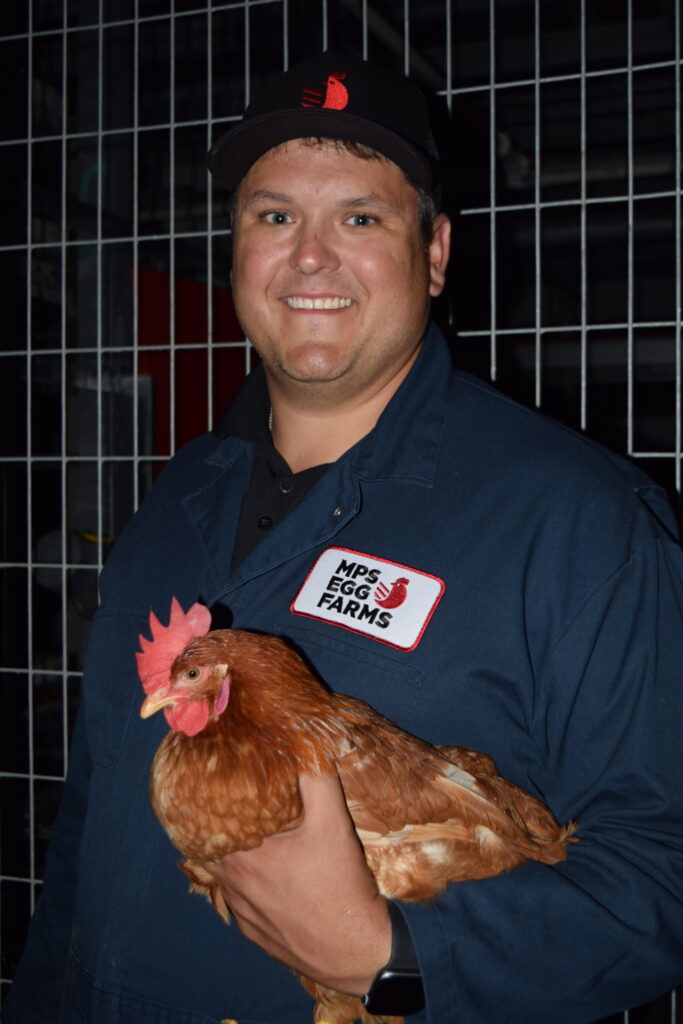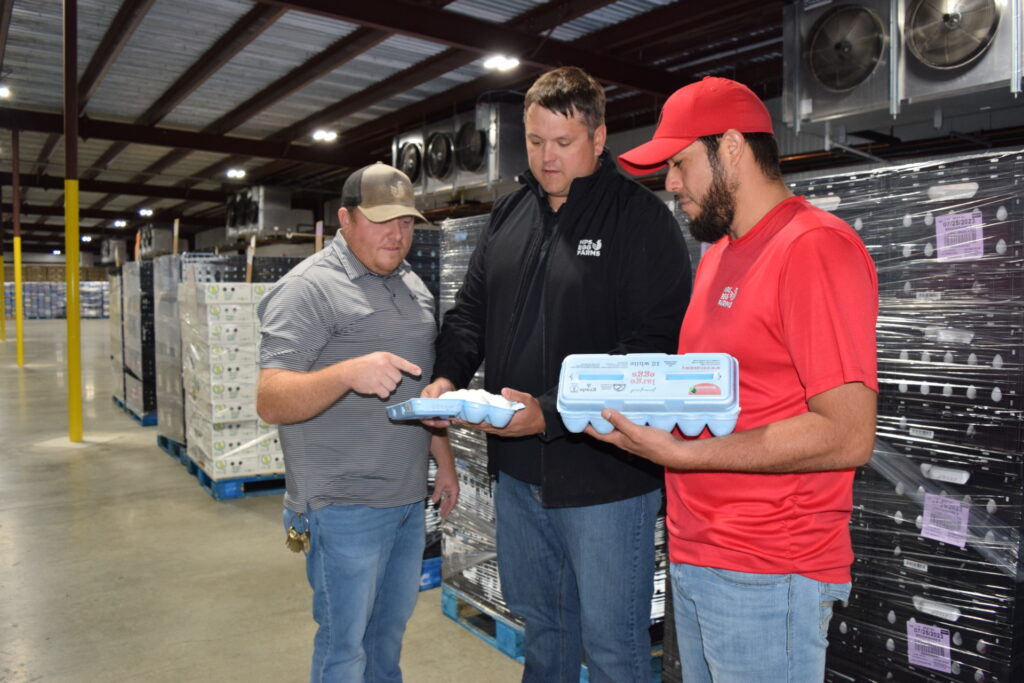‘Family feel’ attracts poultry science graduate to program
T.J. Klein credits time in the department with leading to unexpected career, family
Growing up in the quaint Texas town of Fredericksburg, T.J. Klein ’06 and his family began to raise cattle when he was in high school, but he was never really exposed to the commercial poultry industry.

When Klein started working for a local veterinarian, he also began to show steers. But in spite of his job and the few commercial turkey farms in the area at the time, he had no involvement with poultry.
When he headed off to college after high school, things changed. The Department of Poultry Science in the Texas A&M College of Agriculture and Life Sciences is where he found his home, met his wife and ultimately discovered a passion for an unexpected industry.
Now, he and his wife, Stephanie ’11, make their home in College Station with their three children, and poultry are definitely a part of their lives.
Klein is the director of operations over Texas for MPS Egg Farms, one of the largest egg producers in the U.S. Stephanie works in the department as a Texas A&M AgriLife Extension Service specialist in charge of youth programs.
Below, Klein tells us a little about his journey and shares advice for current poultry science students.
What do you do as director of operations for a major egg producer?
MPS Egg Farms dates back to 1968 and has over 12 million laying hens producing around 300 million dozen eggs per year. We are the sixth largest egg producer in the U.S. with three locations in Indiana, one in Illinois, one in Georgia and two in Texas, where we are rapidly growing. And even though we are one of the largest egg companies in the U.S., we are still family owned, which is something I really love and am proud of.

In my position, I get to wear many hats and am engaged in multiple aspects of the company. I am involved in the process of raising the pullets and layers, egg production and processing, shipment of eggs and product sales to our customers. Additionally, I deal with the production of our poultry feed for the birds. Part of that is purchasing commodities like corn, soybeans and any other additional feed ingredients we may need.
Essentially everything that must happen in the egg industry to produce an egg, I get to be involved with. There are no boring days, and I really enjoy all aspects of my job. I have had opportunities to go into different areas of the poultry industry but have never wanted too.
What does the path from poultry science student to your current position look like?
I earned my bachelor’s and master’s in the Department of Poultry Science but didn’t know what I wanted to do when I graduated. I thought I wanted to go into feed or pharmaceutical sales but was told I needed experience first. So, I set out to get some, and I’ve worked in the industry ever since, more than 13 years.
I started my career with Sanderson Farms as a breeder supervisor. From there I moved to Feather Crest Farms where I began as a complex manager and after seven years, was promoted to the director of operations. That was the role I was in when MPS Egg Farms bought out Feather Crest Farms. I maintained that position and have now been with MPS for over three years.
I think the path I took has been very beneficial for me because it has allowed me to learn the industry from top to bottom and to be involved in every aspect of the business. But there’s always more to learn.
Can you explain the new management style MPS is piloting?
MPS is currently partnered with a company out of the Netherlands on a first-of-its-kind sustainability program, called Kipster. It’s the first carbon neutral egg farm in the U.S. focusing on animal welfare, tackling food waste and reducing carbon emissions. Currently, Kroger has the exclusive rights to the eggs produced through the program. We are currently only working with Kipster in Indiana, so I am not directly involved with it. But MPS is committed to doing what it takes to make it successful.
What do you like the most about your job?
I love the fact that we’re providing a safe protein that is helping to feed the world. I also really like interacting with the people in this industry and our customers. The teams we’re building and the support we receive day to day make the tough days worth it.
What do you do as a member of the Texas Poultry Federation Board of Directors?
I was a member of the Texas Poultry Federation board of directors while working for Feather Crest and have remained on the board with MPS. I also served as president of the Texas Egg Board last year. I recently became involved with the United Egg Producers as a representative for MPS and plan to serve on committees in the near future.
Essentially, these groups exist to support the poultry industry through lobbying, educational events, providing scholarships to future poultry professionals and more. I enjoy being part of a group that ensures the voice of poultry producers is heard.
Why did you choose Texas A&M and poultry science?
My grandfather attended Texas A&M but didn’t finish due to enlisting during WWII. But that didn’t diminish his Aggie spirit. That spirit rubbed off on me and I always knew it was where I wanted to go to school.
Choosing poultry wasn’t quite as obvious since I didn’t know that much about it during high school. Since I showed steers, I didn’t run into any poultry recruiters at livestock shows. However, I had a friend in the department who convinced me to check it out. I immediately noticed the family feel and felt right at home. I like it so much that I stayed on for grad school, studying under Dr. David Caldwell, now the head of the Department of Poultry Science at the University of Arkansas. I worked for him as an undergraduate researcher and stayed on for my master’s.
Do you have any fond memories of your time in the department?
I have a lot. It was great being involved in clubs, both in and out of the department. It was a great way to get to know people and they helped me develop soft skills like speaking to people. I still keep up with friends from those clubs.
I also look back fondly on my time in the anatomy and physiology class I took both as an undergraduate and then in grad school as a teaching assistant, TA. I was the TA for the class when my brother took it. And he’s the reason I eventually became friends with Stephanie. So, I would say there are fond memories there.
What advice would you give current poultry science students interested in a career like yours?
When you finish school, don’t be afraid to work hard and get involved with as much as you can. There are a lot of people in this industry who have been involved in it for a long time. Engage and connect with them. They have knowledge they are more than happy to pass on. You can learn more than you’d ever imagine from them, and you will earn quite a bit of respect in the process.
It’s also important to remember that as you try to move up in your career, the more involved you are, the better you’ll be. Trying to learn all aspects of the industry and the company you work for will only benefit you. It will make advancement easier and will make problem solving easier when they inevitably arise.
Lastly, you don’t always know where your path will lead you, so get engaged and enjoy it.
What is your favorite poultry dish?
I know it sounds cliché, but I really do like eggs. I eat hardboiled eggs as a snack all the time. I’ve also always been a big breakfast guy my whole life and eggs are a major contributor there. But a close second would be BBQ chicken quarters.


